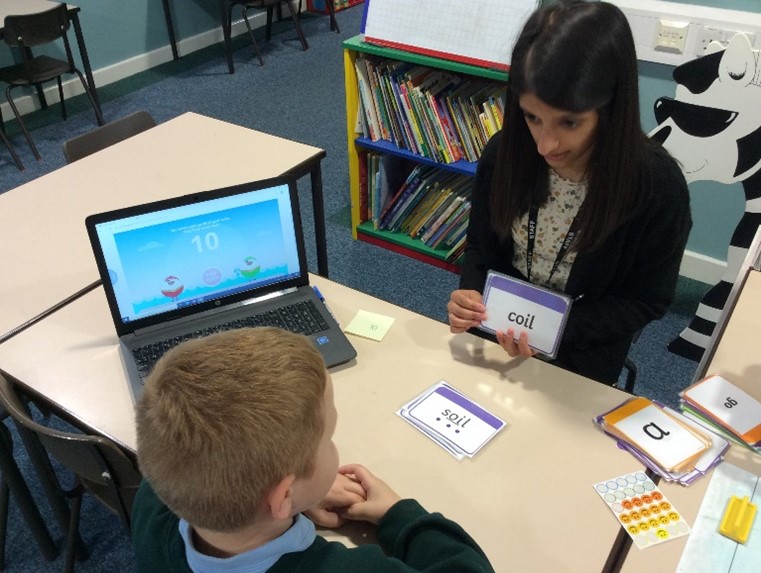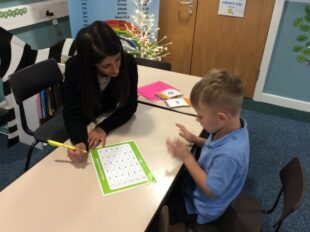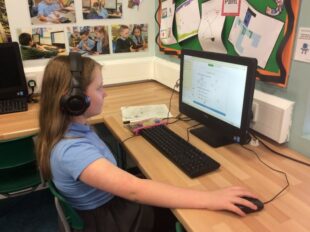
Elaine Williams is Deputy Head at St Peter’s C of E Primary School in Farnworth. She explains how they have made use of the government-funded National Tutoring Programme to employ an academic mentor to help with small group and 1:1 work, as well as using Third Space Learning which offers online tutoring.
Our children returned from lockdown having had a range of experiences. While some had fully engaged with our remote learning offer and continued to make good progress, others experienced significantly disrupted learning, and the ordinarily disadvantaged context of their home life was exacerbated.
We identified children who needed extra support in a variety of ways.
- Class teachers identified children who had found learning remotely quite challenging or who didn’t engage as much as they’d like and needed more direct support to embed concepts and build their confidence.
- We used data collected in school to help identify children who were struggling with key areas.
- Some parents who had voiced concerns over their child missing face-to-face teaching were also offered the opportunity for their child to participate in sessions.
Why we chose to work with the National Tutoring Programme (NTP)
Engaging with NTP allowed us to target individual pupil needs, enhance provision and increase learning. It also gave us the opportunity to choose how to spend the funds, directing it to particular groups of children who we thought needed it the most.
Our engagement with the programme is two-fold. We have used our catch-up premium to:
- employ a subsidised academic mentor through Teach First to work with our Year 2 pupils
- work with Third Space Learning to provide 1:1 tuition for pupils in KS2
1) Academic mentoring through Teach First

We chose to employ a subsidised academic mentor through Teach First for various interventions for our Year 2 pupils, particularly for reading as this was a key area for many children. The academic mentor works with children in groups and on a 1:1 basis including supporting children with their reading comprehension skills, maths and literacy tasks and speech and language intervention.
The children have responded extremely well and thoroughly enjoy their sessions with the academic mentor. A recent assessment for phase 3 phonics shows that all children she has been working with are now ready to move onto phase 4, which is excellent progress. The same group of children can now apply their phonic knowledge in their writing and are much more confident writing independently, which has been fantastic to see.
Not only have the children made considerable progress but they have grown in confidence. Our mentor is passionate about helping children bridge the gaps and encouraging children to achieve and succeed. She is always extremely well prepared with her resources and picks up daily interventions that occur with other children in the class, which once again has been brilliant.
2) 1:1 tuition with Third Space Learning
Third Space Learning specifically offered maths tutoring using an online platform. This meant we could easily access it at times that suited us, and we know our children respond well to interactive, online programmes. We also liked how responsive the programme was to children’s needs: the diagnostic element would recognise areas of weaker knowledge and focus the 1:1 support on these.

The maths tutoring has been rolled out to several year groups and has proven very popular. The children look forward to the sessions and find the platform easy to navigate. Most children take part in one session a week; they spend 45 minutes with the tutor working on areas that the initial diagnostic program identified as needing targeted support, followed by 15 minutes working independently on questions linked to the session. Crucially, the tutors invest time in building relationships with the children to help them feel comfortable with the sessions.
Although it’s still early to measure impact on attainment, staff feel that children are gaining confidence with maths and approaching questions in class in a more positive way. Engaging with the NTP offer has definitely enabled us to provide a wider range of learning opportunities for our children, meet their specific needs through tailored teaching opportunities and boost their confidence and skills so that they can tackle future learning challenges and progress.
Find out more about the National Tutoring Programme
All state-maintained schools can access tutoring subsidised by 75% through the National Tutoring Programme, to support pupils who need extra help.
- Schools can search for approved NTP Tuition Partners and enquire directly with providers. Online tutoring can be provided to pupils at home or in school.
- The NTP are offering bespoke information sessions in local areas for groups of schools. Please contact info@nationaltutoring.org.uk for more information.
Find out how you can use the Catch-Up Premium towards the National Tutoring Programme.
Want to receive blog posts in your inbox?